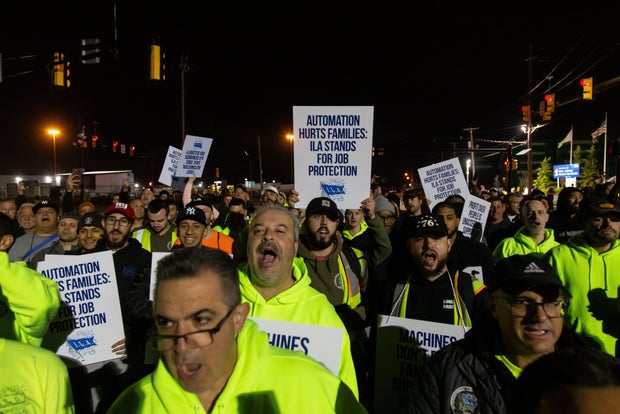Dockworkers walk off the job as port strikes are called at East and Gulf Coast cargo facilities.
Thousands of dockworkers at ports from New England to Texas went on strike after midnight Tuesday as they rallied for higher wages and more job protections.
Off to work, at first Eastern and Gulf Coast ports since 1977It follows a long impasse in labor talks between the International Longshoremen's Association (ILA) and the United States Maritime Alliance (USMX), a shipping industry group representing terminal operators and ocean carriers.
According to the USMX, the strike is expected to involve 25,000 workers and shut down 14 ports: Baltimore; Boston; Charleston, South Carolina; Jacksonville, Florida; Miami; Houston; Mobile, Alabama; New Orleans; New York/New Jersey; Norfolk, Virginia; Philadelphia; Savannah, Georgia; Tampa, Florida; and Wilmington, Delaware.
“The USMX brought this strike after they decided to hold on to foreign-owned ocean carriers that make billions of dollars in profits at US ports, but do not compensate the American ILA longshore workers who do the labor that brings them wealth,” ILA President Harold Daggett posted on social media. In a statement made by Dr. “We stand ready to fight as long as necessary, to remain on strike for as long as it takes, to get the wages and protection against automation that our ILA members deserve.”
The ILA is demanding a huge wage hike and a total ban on the use of automatic cranes, gates and container-moving trucks in unloading or loading goods.
The union said it “shut down all ports from Maine to Texas … as tens of thousands of ILA rank-and-file members began setting up picket lines at waterfront facilities up and down the Atlantic and Gulf coasts” after the last USMX proposal that “ILA rank- End-file members have fallen far short of what they are demanding in terms of wages and protection against automation.”
The ports of New York and New Jersey quickly said they were closing many facilities Tuesday because of the strike. So did the Port of Virginia.
Workers began picketing at the Port of Philadelphia shortly after midnight, walking in a circle at a rail crossing outside the port while chanting “no work without a fair deal,” the Associated Press reported, with message boards flanked by the ILA. One truck says, “Automation Hearts Family: ILA Stands Up for Job Protection.”
President Joe Biden, a close ally of organized labor, has declined to intervene directly, citing the need to respect collective bargaining rights. But business groups are sure to step up calls for action if the strike continues.
Biden and Vice President Kamala Harris are “closely monitoring potential supply chain impacts and evaluating ways to address potential impacts, if necessary,” the White House said in a statement Tuesday. “The president and vice president were briefed on agency assessments that show the impact on consumers is expected to be limited at this time, including in the critical areas of energy, food and medicine.”
It comes on the heels of walkouts by US automakers and Boeingamong others
Potential impact on consumers and the economy
The ports affected by the strike handle about half of the nation's ship cargo. Experts say the economic impact of prolonged work stoppages could be steep, potentially raising consumer prices and creating shortages ahead of the holidays.
A week's strike may cost The US economy is about $3.8 billion And according to the Conference Board, increased consumption of consumer goods.
“Transports diverted to the West Coast and then placed in freight networks east can add at least a week of transit time and additional costs,” Wedbush Securities analysts said in a note to investors. “We see the potential for ripple effects for the East Coast and Gulf Coast due to limited exposure to primarily bound shipments, and even the lack of capacity for West Coast ports to absorb fully disrupted volumes.”
For consumers and businesses, a prolonged strike could disrupt shipments of goods such as bananas, manufacturing components, plywood and raw materials such as cotton and copper. Fresh meat and other refrigerated foods can also spoil, leading to shortages and rising prices.
Still, many retailers and other businesses have been preparing for months, stockpiling goods that could be disrupted by port closures.
“Products for the holiday season usually ship between August and October,” Wedbush said. “With that said, we believe most holiday-heavy retailers adjust their schedules in anticipation of a labor disruption — limiting some near-term downside risk in our view.”
Shortly after the walkout began, New York Governor Cathy Hochul issued a statement saying her administration “is working around the clock to make sure our grocery stores and medical facilities have the supplies they need. Reaching out to the USMX and ILA is critical. A fair deal soon.” We will continue our efforts to minimize disruptions for New Yorkers that respect workers and ensure the flow of commerce through our ports.”
Dr. Hochul at a press conference in New York on Monday Don't expect scarcity Items needed anytime soon, and he advises consumers against stockpiling products.


